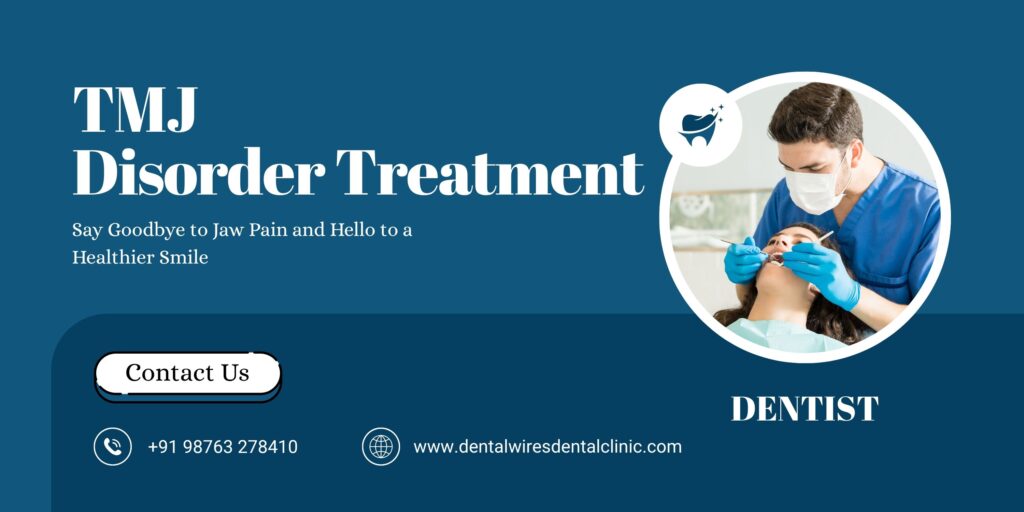Do you often hear clicking sounds when you open your mouth? Or feel pain in your jaw while chewing or speaking? These might be signs of a TMJ disorder. The temporomandibular joint (TMJ) is a small but crucial hinge that connects your jawbone to your skull. When this joint is irritated or damaged, it can lead to discomfort, difficulty in movement, and chronic facial pain. In this blog, we’ll break down everything you need to know — from TMJ symptoms and causes, to effective TMJ Disorder Treatment options, along with tips for long-term TMJ Pain Relief.
What Is a TMJ Disorder?
A temporomandibular joint disorder occurs when there is dysfunction in the jaw joint or surrounding muscles. This can affect one or both sides of the face and may vary in severity. While some people experience mild symptoms that go away with home care, others might need professional intervention for long-lasting relief.
The condition can impact basic activities like chewing, speaking, or even yawning — making timely diagnosis and care essential.
Common TMJ Symptoms and Causes
Symptoms of TMJ Disorders:
- Pain or tenderness in the jaw
- Clicking or popping sounds when opening the mouth
- Difficulty chewing or a locking jaw
- Pain in or around the ears
- Frequent headaches or neck stiffness
- Swelling on one or both sides of the face
These TMJ symptoms and causes can affect daily life, making it hard to perform basic functions comfortably. It’s important to recognize the early signs before the condition becomes chronic.
Common Causes:
- Teeth grinding or jaw clenching (often during sleep)
- Jaw injury or trauma
- Arthritis in the jaw joint
- Stress, which leads to muscle tension in the face
- Poor posture that strains neck and jaw muscles
- Dental misalignment or bite issues
Identifying the root cause is key to selecting the right TMJ disorder treatment for long-term improvement.
How Is TMJ Diagnosed?
A dentist or specialist typically starts with a physical examination, checking for tenderness, jaw movement limitations, and sounds like popping or grinding. Imaging tests such as X-rays, CT scans, or MRIs may be used to assess the condition of bones and tissues around the jaw.
Accurate diagnosis helps create a targeted treatment plan that addresses both symptoms and their underlying causes.
TMJ Disorder Treatment Options
Depending on the severity, TMJ disorder treatment can range from simple lifestyle adjustments to more involved medical procedures. The goal is to reduce pain, restore jaw function, and prevent further damage.
1. Home Remedies and Lifestyle Changes:
- Use of hot or cold compresses
- Eating soft foods to reduce strain
- Avoiding gum chewing and wide yawning
- Gentle jaw exercises
- Stress-reducing techniques like yoga and meditation
These remedies are great for early-stage TMJ pain relief and prevention.
2. Medication:
- Pain relievers and anti-inflammatories
- Muscle relaxants
- Low-dose antidepressants for chronic pain management
These medications can provide temporary relief, especially during flare-ups.
3. Dental Appliances:
- Nightguards or splints to prevent teeth grinding
- Bite adjustment devices to improve jaw alignment
Dental devices are among the most common non-invasive solutions for jaw joint disorders.
4. Physical Therapy:
- Jaw stretches and massage therapy
- Ultrasound treatment
- Posture correction exercises
Physical therapy is often recommended alongside other treatments for long-term results.
5. Surgical or Advanced Treatments (for severe cases):
- Corticosteroid or Botox injections
- Arthrocentesis (flushing the joint)
- TMJ surgery (rare and used as a last resort)
These options are considered only when conservative treatments fail to provide relief.
TMJ Pain Relief: Simple Techniques That Help
Finding the right method for TMJ pain relief often involves trial and error. Here are some techniques many patients find helpful:
- Apply warm compresses to relax jaw muscles
- Practice jaw relaxation exercises regularly
- Maintain good posture while working or sleeping
- Avoid hard and crunchy foods
- Stay hydrated to reduce muscle stiffness
These techniques can be highly effective when used consistently and under guidance.
Looking for a TMJ Specialist in Panchkula?
If you’re experiencing ongoing jaw pain, discomfort, or restricted jaw movement, it’s best to consult a professional. At Dental Wires Dental Clinic, we offer expert care and advanced diagnostics for temporomandibular joint disorder. Our team includes a trusted TMJ Specialist in Panchkula who can evaluate your condition and recommend the right approach to treatment.
Conclusion: Act Early to Avoid Long-Term Jaw Issues
Ignoring jaw discomfort or brushing it off as stress can worsen the problem over time. Whether it’s jaw clicking, facial pain, or difficulty chewing, addressing these signs early can make all the difference.
Understanding the TMJ symptoms and causes helps in making informed decisions about treatment. From home care to professional TMJ disorder treatment, several options are available to restore comfort and jaw function. For lasting TMJ pain relief, don’t wait — consult a specialist and take the first step toward recovery.
